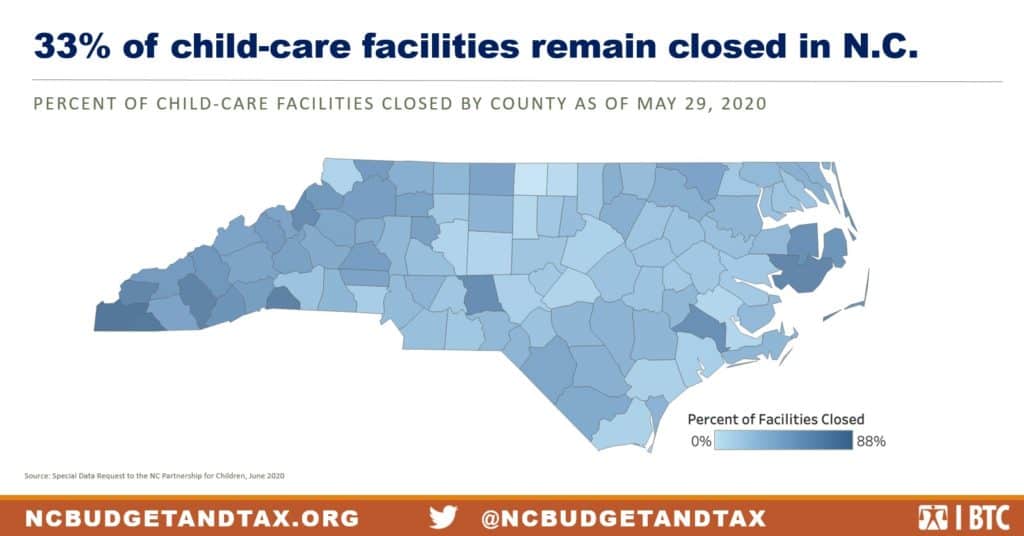Even before COVID-19 hit our state, most North Carolina communities faced a serious child care shortage. Now 33% of child care programs are closed statewide due to COVID-19. Those that remain open are struggling financially. Parents and businesses are wondering how our state will get back to work when working families can’t find care for their young children.
State leaders moved quickly to keep the child care sector from collapsing when COVID-19 first struck. NC DHHS offered important, temporary financial supports for parents, teachers, and programs. Unfortunately the federal funding to continue these supports will soon run out. The NC General Assembly should act in the weeks ahead to ensure the child care sector stays open for the children, parents, and North Carolina businesses who rely on it.
Early Education: Essential for kids, parents, and business
Early care and education programs support children, parents, and North Carolina businesses. High-quality programs provide young children with the social and emotional skills they need to enter kindergarten ready to learn. They help parents enter and stay on the job market, confident that their children are safe and in a caring environment. And they fuel the economy by ensuring that today’s workforce can stay on the job.
In short, childcare providers are the workforce behind the workforce. The budget decisions our leaders make in the next few weeks will have tremendous impact, both on the education and development of our youngest children, and on North Carolina’s capacity to build back our economy in the coming years.
State leaders must take action
The NC DHHS Division for Child Development and Early Education (DCDEE) has moved quickly in this pandemic to allocate federal funding for emergency purposes. They deserve praise for this decisive action. The NC General Assembly also responded to calls from the early childhood community. The legislature elevated child care on the list of entities prioritized to receive PPE, and included child care providers in a bundle of agencies to receive $19M in federal relief funds under the COVID-19 Recovery Act.
Thanks to quick action by state leaders, half of all childcare centers in the state were able to remain open to support essential workers responding to COVID-19. And in the past month, more child care programs have been able to reopen and care for children again. However, most centers are operating on dramatically reduced revenue. The situation is not sustainable without additional COVID-19 emergency aid.
More closures in rural areas – especially WNC
Importantly, child care programs in some rural areas of the state, especially Western North Carolina, are struggling more than other areas to re-open. At the start of June, half of all child care facilities in Buncombe were closed, 70% closed in Avery County, and 3 out of 4 child care programs were closed in Graham County. These areas are going to need targeted support to re-open their child care programs and ensure parents have options for the care of their children as the economy reopens.

Actions North Carolina legislators can take
With more than $1.8 billion in federal COVID-19 relief still being held in reserve by the NC General Assembly, our state has the financial resources for the child care sector to provide the foundation for a solid economic recovery. With funding allocated by the NC General Assembly, our state could:
- Continue bonus pay for teachers. Early childhood educators currently make on average $10.50 an hour, much lower than living wage. They are putting their health and lives on the line to care for our youngest children. NC DHHS should continue these payments throughout the pandemic period.
- Continue emergency child care subsidies. These payments should continue throughout the pandemic period to support families of essential workers.
- Continue to provide operational and recovery grants. Many centers need grants in order to remain open because of significant reduction in enrollment during the pandemic. Others will need financial support to re-open at all. The grants currently provided by DHHS are a lifeline for programs. Their continued availability will be critical in the months ahead.
- Continue waiving the parent co-pay fee for subsidy slots. As the pandemic continues to damage the economy, low-income families who receive child care subsidy are struggling to cover their co-pay fees. Waiving the parent co-pay fees will help these families rebuild their own financial security while allowing child care programs to retain an important source of revenue.
Response and Resources
You can take action on this important issue today. Please join us in calling on state legislators to provide additional emergency funding to our early childhood providers.
Finally, if you are a parent who is struggling to find child care during the pandemic, there is help for you and your family. A hotline is available to help families find child care programs that are open and meeting NCDHHS health and safety guidelines. Parents and caregivers can call (888) 600-1685 from 8 a.m. to 5 p.m., Monday through Friday. You can also visit NC DHHS website for additional resources and support.


